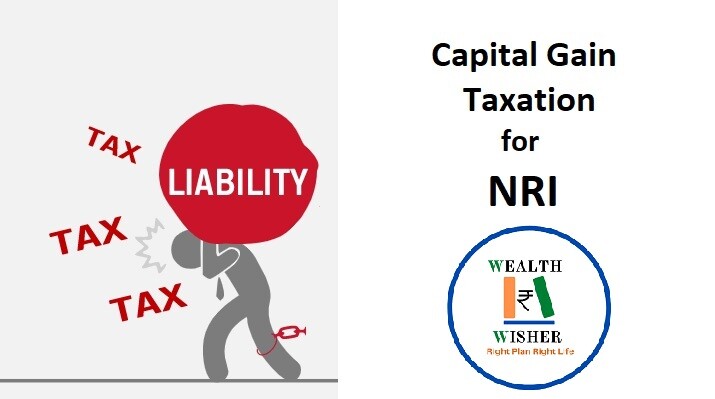NRIs have different taxation rules compared to residents. Residents pay tax on income earned in India & globally. Whereas NRI needs to offer only global income for taxation. Taxation matters get complex when NRI is investing in India and has to pay tax on Capital Gain. Here is a small dossier on the treatment of Capital Gain Taxation for NRIs.
Capital Gain Taxation for NRIs or loss arises when a person (NRI in our case) sells a capital asset. It does not include personal assets like furniture or books. It has to be a capital asset like a property, a security (shares, mutual funds, or bonds).
A capital asset is defined as any property held by the person, any securities held by Foreign Intuitional Investors Unit Linked Insurance Plan (to which exemption u/s 10(10D) does not apply). It excludes, any stock in trade, consumable stores, or raw materials held for purposes of business and personal movable assets (it excludes jewelry, archaeological collection drawings, paintings sculptures, and other works of art).
Capital Gain Taxation for NRIs
The tax rate depends upon the type of instrument and the period for which the non-residents hold them before selling.
Rule no 1 is the income should come by selling security issued by Indian authority or situated in India.
Capital Gain Taxation for NRIs has a different mechanism of tax. First, they classified a Long Term Capital Gains (LTCG) or Short Term Capital Gains (STCG).
The capital asset is to be classified as a short-term/long capital asset based on the period of holding after buying it.
This is as follows:
| Asset Class/Security | Holding period to qualify as STCG | Holding period to qualify as LTCG |
| Shares | Less than 12 Months | Greater than 12 Months |
| Units of Equity Mutual Funds | Less than 12 Months | Greater than 12 Months |
| Zero-Coupon Bonds | Less than 12 Months | Greater than 12 Months |
| Unlisted Shares | Less than 24 Months | Greater than 24 Months |
| Real Estate (Land & Building) | Less than 24 Months | Greater than 24 Months |
| Units of Debt Mutual funds | Less than 36 Months | Greater than 36 Months |
| Unlisted Securities other than shares | Less than 36 Months | Greater than 36 Months |
Tax rates on LTCG & STCG – Capital Gain Taxation for NRIs
| Asset Class/ Security | LTCG Rate | STCG Rate | Remark |
| Listed Shares & Equity MFs | 10% | 15% |
· In case the LTCG is less than Rs. 1 lakh in a Financial Year, the gain is exempt from tax. · Securities Transaction Tax (STT) is paid on the acquisition and sale of equity shares. · STT is paid on the sale of equity MF units. · Indexation Benefit is not allowed |
| Unlisted Shares & Securities | 10% | Applicable Tax Rate | No Indexation Benefit is allowed |
| Debt MFs | 20% | Applicable Tax Rate | While calculating LTCG Indexation Benefit is allowed. |
| Other Assets (Property, Bonds & Other unlisted securities) | 20% | Applicable Tax Rate | While calculating LTCG Indexation Benefit is allowed. |
The rates do not include Education & Health Cess & Surcharge
The Non-resident can take relief from double taxation if India has signed the Double Taxation Avoidance Agreement (DTAA) with the country of residence. As per the treaty, the NRIs can pay tax in either of the countries or pay the tax in both the countries and claim tax relief in the country of residence.

Some considerations for Capital Gain Taxation for NRIs
NRIs are subject to TDS at the applicable rates.
TDS is on capital gains earned irrespective of any threshold value
NRI cannot adjust its capital gains against the basic exemption limit (currently INR 2.5 Lakhs per annum).
No claim of deduction Chapter VI-A (Current Limit INR 1.5 Lakhs) is available against the income from investment and capital gains;
NRLs can claim capital gains exemption by making certain investments (only in the case of property). Section 54 deals with this.
If transfer or transaction is done outside India and both parties include NRIs it does not fall under capital gain taxation purview.
Capital gains on GRDs, Rupee Denominated Bonds, and Government Security with period payment of Interest and other specified capital assets by Non-residents outside India are not eligible for income-tax & capital gain benefits. Since the same is not regarded as a transfer of assets.
If gains arise in Foreign Currency, the telegraphic transfer buying (‘TTBR’) and Telegraphic transfer selling rate (‘TTSR’) will be used to convert the transfer amount to Indian currency.
Do NRI Need to File ITR?
The Income-tax department has made it clear that in case during the year, NRI only has income from investments and TDS has been deducted on that, he may not file ITR as it is not compulsory.
But if TDS is more than the tax payable, he/she should file ITR and get a refund.
Hope you have a good idea on Capital Gain Taxation for NRIs. Do reach out in case of any doubt via email madhupam at the rate thewealthwisher dot com or the comments section below.








